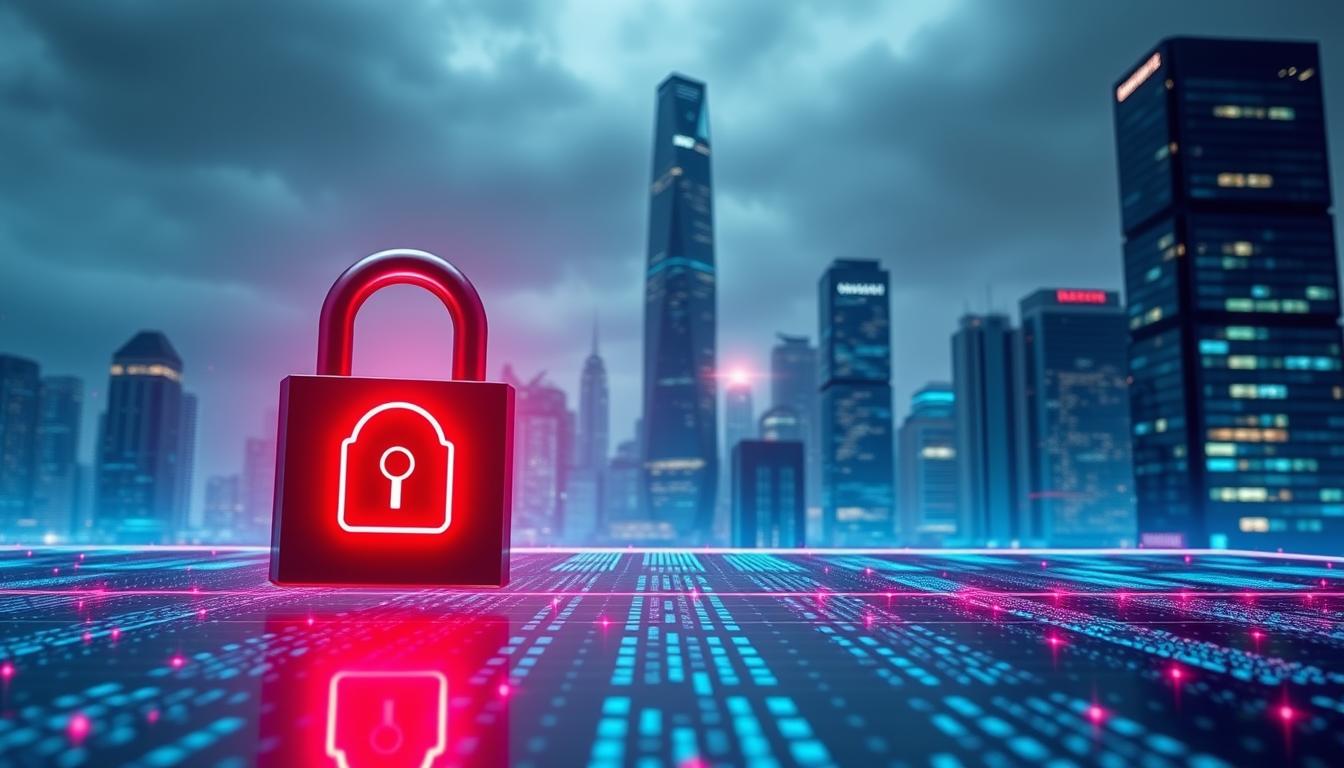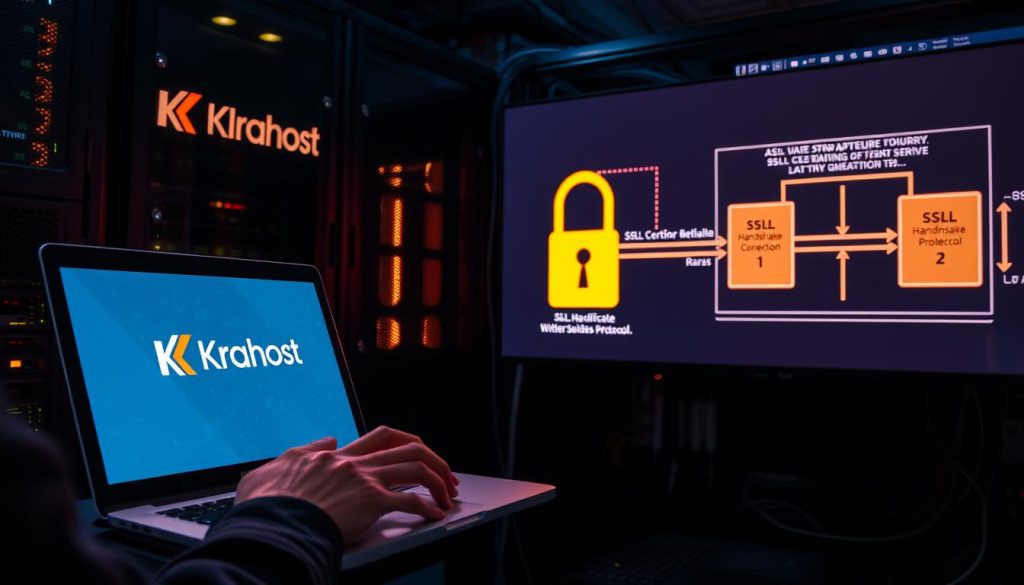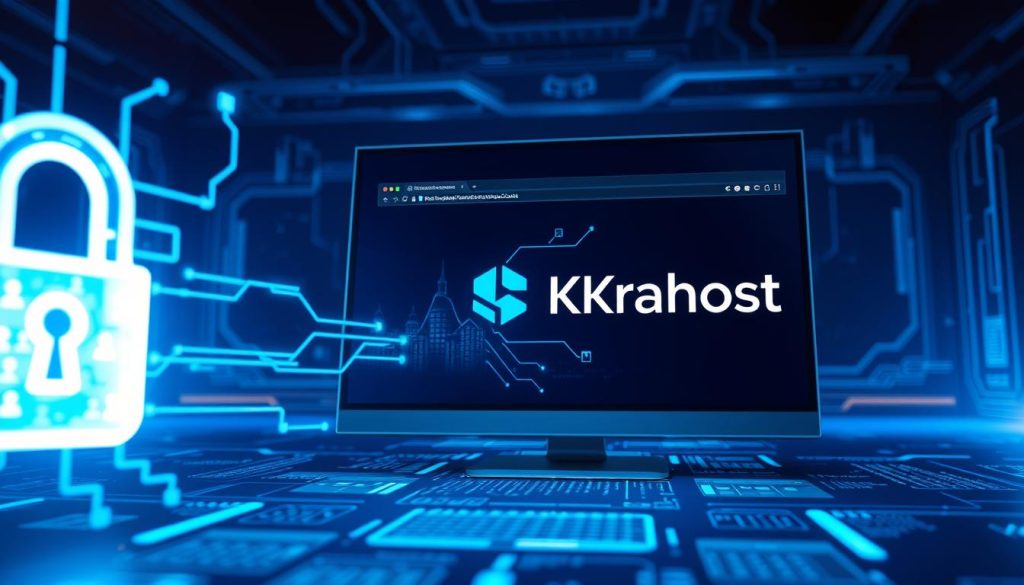
Website Security Made Simple: Safeguard Your Site Today
In today’s digital world, keeping your online presence safe is key. A cyber security breach can cause big problems, like losing money and hurting your reputation.
To lower the risk of a breach, take steps to secure your site. Krahost.com provides trusted hosting and domain registration. They help keep your online space safe.
Putting website security first means your site stays safe. It also keeps your users’ personal info secure.
Key Takeaways
- Understand the importance of cyber security
- Learn how to protect your site from possible threats
- Discover reliable hosting services and domain registration with Krahost.com
- Take proactive steps to secure your online presence
- Ensure your site’s integrity and protect user data
The Critical Importance of Website Security in Ghana
As the digital world grows, keeping websites safe is key in Ghana. The area’s online growth has brought more cyber threats. This makes web protection a big deal for both businesses and people.
Current Cybersecurity Landscape in West Africa
In West Africa, and Ghana in particular, cyberattacks are on the rise. These include phishing, malware, ransomware, and DDoS attacks. Reports show a big jump in cybercrime, with Ghana being a main target because of its digital growth.
How Security Breaches Impact Ghanaian Businesses
Security breaches can really hurt Ghanaian businesses. They can lead to money loss, damage to reputation, and legal problems. A study found that cyberattacks cause big financial losses and hurt customer trust.
| Impact of Security Breaches | Consequences for Businesses |
|---|---|
| Financial Losses | Stolen funds, loss of revenue |
| Reputational Damage | Loss of customer trust, brand devaluation |
| Legal Liabilities | Fines, legal action, compliance issues |
To avoid these problems, Ghanaian businesses should focus on web protection. They should look into hosting and domain services from trusted providers like Krahost.com to protect their online space.
Common Website Security Threats Targeting Ghanaian Websites
If you own a website in Ghana, you know about the dangers online. Your site, whether for shopping, info, or fun, is a target for bad actors. Knowing these threats helps keep your site safe.
Malware and Ransomware Attacks
Malware and ransomware are big dangers for websites. Malware is software made to harm your site. Ransomware demands money to get your data back. These can cause data loss, theft, and harm your reputation. Keep your site’s software updated and use website encryption to protect your data.
SQL Injection and Cross-Site Scripting Vulnerabilities
SQL injection and Cross-Site Scripting (XSS) are common threats. SQL injection injects bad SQL code into your database, risking data theft. XSS injects harmful scripts into your site, executed by users’ browsers. Update your site regularly and use secure coding to avoid these attacks.
DDoS Attacks and Their Business Consequences
DDoS (Distributed Denial of Service) attacks flood your site with traffic, making it unreachable. These attacks can cause lost sales, damage reputation, and lower customer trust. For Ghanaian businesses, a DDoS attack can be very costly. Use strong security, like Krahost.com, to keep your site secure and open.
Understanding these threats helps you protect your online space. For top security, including hosting and domain registration, check out Krahost.com. Safeguard your website today.
Essential Website Security Measures Every Site Owner Should Implement
Securing your website is key. In today’s world, web security solutions are a must. As a site owner in Ghana, protecting your online space is vital.
Regular Software Updates and Patch Management
Keeping your website’s software current is essential. Old software can be a target for hackers.
Creating an Update Schedule
Make a schedule for updates. This helps prevent security risks from outdated software.
Automating Security Updates
Automate updates when you can. This keeps your site safe from new threats.
Strong Password Policies and Multi-Factor Authentication
Strong passwords and MFA are critical. They help protect your site from unauthorized access.
Data Backup Strategies for Ghanaian Businesses
Regular backups are key for business safety. Ghanaian businesses need a solid backup plan. This includes both local and remote backups.
These security steps can greatly improve your website’s safety. For secure hosting, check out Krahost.com for your website and domain needs.
Secure Hosting: The Foundation of Website Security
A secure hosting service is key to protecting your website and data. Your hosting provider is vital in keeping your site safe. They store your site’s files and make them public.
“The right hosting provider can make all the difference in protecting your website from cyber threats,” emphasizes the importance of choosing a secure hosting service.
What Makes a Hosting Provider Secure
A secure hosting provider uses strong security to protect its infrastructure and clients’ data. Key features include:
- Regular software updates and patch management
- Strong firewall configurations and intrusion detection systems
- Data encryption and secure data centers
- 24/7 security monitoring and incident response
These features help create a safe hosting environment. They protect your website and customer data.
How Krahost.com Ensures Maximum Security for Ghanaian Websites
Krahost.com focuses on keeping clients’ websites safe with advanced security and expert monitoring. By choosing Krahost.com, you get:
Server-Level Security Features
Krahost.com uses server-level security features such as:
- Customized firewall rules
- Intrusion detection and prevention systems
- Regular security updates and patches
These ensure your website is safe from web attacks and vulnerabilities.
The Krahost.com team monitors security 24/7. They quickly respond to threats. This keeps your site safe from harm.
Hosting with Krahost.com lets you focus on your business. Get top hosting services and domain registration from Krahost.com. Ensure your website’s security and reliability.
Domain Security Best Practices for .GH and International Domains
In today’s digital world, keeping your domain secure is key. It helps build trust and keeps your online space safe. Securing your domain is vital to protect your online presence and stop cyber threats.
Domain Privacy Protection Explained
Domain privacy protection is a must for keeping your domain safe. It hides your personal info from the public WHOIS database. This helps avoid spam, identity theft, and other bad stuff.
With domain privacy protection, you can:
- Stop spammers from getting your contact info
- Lower the chance of identity theft and phishing
- Keep your personal data safe from misuse
DNSSEC Implementation Steps
DNSSEC adds a security layer to your domain by digitally signing your DNS records. To set up DNSSEC, follow these steps:
- Make a pair of cryptographic keys
- Sign your DNS zone with the private key
- Share the public key in your DNS zone
- Make sure your DNS provider supports DNSSEC
| DNSSEC Benefits | Description |
|---|---|
| Authenticity | Makes sure DNS responses are real and not changed |
| Integrity | Keeps your DNS safe from spoofing and man-in-the-middle attacks |
Premium Domain Security Features from Krahost.com
Krahost.com has top-notch domain security features. These include:
- Domain privacy protection
- DNSSEC support
- Two-factor authentication for domain management
Registering your domain with Krahost.com gets you these advanced security tools. This keeps your domain safe from cyber threats.
Step-by-Step Guide to Implementing SSL Certificates
SSL certificates are key for website security. They keep data between your site and users safe. As a website owner in Ghana, getting an SSL certificate is vital. It protects your site and keeps users trusting you.
Types of SSL Certificates and Their Benefits
There are many SSL certificates, each with its own level of security. Domain Validation (DV) certificates check if you own the domain. Organization Validation (OV) certificates verify your business identity. Extended Validation (EV) certificates are the most secure, with a detailed check.
| Certificate Type | Validation Level | Use Case |
|---|---|---|
| DV | Basic Domain Verification | Personal blogs, small businesses |
| OV | Organization Verification | Businesses requiring higher security |
| EV | Extended Verification | E-commerce sites, financial institutions |
How to Install an SSL Certificate on Your Website
Getting an SSL certificate involves a few steps. First, you need to create a Certificate Signing Request (CSR). Then, get the certificate from a Certificate Authority (CA). Lastly, install it on your server.
Installation on cPanel Hosting
For cPanel users, it’s easy. Just go to the SSL/TLS section, enter your CSR, and follow the instructions.
Installation on WordPress Sites
WordPress users can use plugins like “Really Simple SSL” to install SSL certificates. Or, they can manually set it up. Make sure to update your site’s URL to HTTPS and set up any redirects.

Verifying Your SSL Implementation
After installing, check your SSL certificate with tools like SSL Labs’ SSL Test. Make sure there are no warnings about mixed content. Also, all pages should load over HTTPS.
By following these steps, you can make your website more secure. This protects your users’ data and keeps their trust. For reliable hosting and domain registration, check out Krahost.com for your SSL certificate needs.
“The importance of SSL cannot be overstated. It’s a fundamental part of keeping your users’ data safe.” –
Comprehensive Website Security Monitoring and Maintenance Plan
Keeping your website safe is an ongoing task. It’s key for a trustworthy online presence, vital in Ghana’s digital world. You must have a solid security plan to stay safe.
Essential Security Scanning Tools and Services
To spot weaknesses, use essential security scanning tools and services. These tools find malware and other threats. Tools like Acunetix, Nessus, and Qualys are great for this. They help you stay ahead of security risks.
Establishing a Regular Security Audit Schedule
Regular security checks are a must. Set up a regular security audit schedule to keep your site safe. This means checking your site’s code and user access. Regular checks find and fix security issues early.
Creating an Incident Response Plan
Even with good security, incidents can happen. So, it’s vital to create an incident response plan. This plan outlines how to handle security breaches. It includes how to communicate and fix the problem.
| Security Measure | Description | Frequency |
|---|---|---|
| Security Scanning | Identify vulnerabilities using security scanning tools | Weekly/Monthly |
| Security Audits | Comprehensive review of website security posture | Quarterly |
| Incident Response | Plan and execute response to security incidents | As needed |
These steps will greatly improve your website’s security. For top-notch hosting and domain services, check out Krahost.com.
E-commerce Security: Protecting Customer Data in Ghana’s Digital Economy
In Ghana’s digital world, keeping customer data safe is key for e-commerce success. Online shopping is growing, but so are the risks of data theft and cyber attacks. Strong security is a must.
E-commerce in Ghana needs to focus on keeping customer info safe. This means using top-notch security steps and following global data protection rules.
PCI DSS Compliance Requirements for Ghanaian Businesses
The Payment Card Industry Data Security Standard (PCI DSS) sets security rules for handling credit card info. For Ghanaian businesses, following PCI DSS is not just good practice. It’s essential for keeping customers’ trust and avoiding big fines.
To meet PCI DSS standards, Ghanaian e-commerce sites must:
- Install and maintain a firewall to guard cardholder data
- Use strong encryption to protect cardholder data
- Keep systems updated to stop known threats
- Limit who can access cardholder data
| PCI DSS Requirement | Description | Benefit |
|---|---|---|
| Firewall Configuration | Protect cardholder data with a properly configured firewall | Prevents unauthorized access |
| Cryptography | Encrypt cardholder data during transmission and storage | Protects against data breaches |
| Regular Updates and Patches | Keep systems and software up-to-date with the latest security patches | Reduces vulnerability to known threats |
Secure Payment Gateway Integration with Local Payment Methods
Using a secure payment gateway that supports local payment options is critical for Ghana’s e-commerce. It makes shopping online easier and safer for customers.
When picking a payment gateway, look for these features:
- Support for local payment methods like MTN Mobile Money and Vodafone Cash
- Meets PCI DSS standards
- Has strong security features, like encryption and tokenization
By focusing on e-commerce security and following global standards like PCI DSS, Ghanaian businesses can keep customer data safe. This builds a trustworthy online shopping space. For reliable hosting services, check out Krahost.com.
Advanced Website Security Techniques for Enhanced Protection
Advanced security techniques are key to protecting your website from complex threats. As a website owner in Ghana, using these measures can greatly improve your site’s security.
Implementing Web Application Firewalls (WAF)
A Web Application Firewall (WAF) is a vital tool to protect your website from common threats. It filters and monitors HTTP traffic, stopping attacks like SQL injection and XSS. You can use a cloud-based service or a hardware appliance for a WAF. Make sure it’s set up to block malicious traffic.
Content Security Policy Configuration
Content Security Policy (CSP) is a critical feature to detect and prevent attacks. It defines which content sources are allowed on your web page. For example, you can limit script loading to trusted sources. Setting up CSP requires careful planning to avoid blocking legitimate content.

Security Headers Implementation Guide
Security headers are HTTP response headers that improve your website’s security. They tell the browser how to handle your site’s content. Important headers include Strict-Transport-Security (HSTS), Content-Security-Policy, and X-Frame-Options. Adding these headers can greatly reduce web attack risks.
| Security Header | Purpose | Example |
|---|---|---|
| Strict-Transport-Security (HSTS) | Forces the browser to use HTTPS | Strict-Transport-Security: max-age=31536000 |
| Content-Security-Policy (CSP) | Defines allowed sources of content | Content-Security-Policy: default-src 'self'; |
| X-Frame-Options | Prevents clickjacking attacks | X-Frame-Options: DENY |
By using these advanced security techniques, you can greatly improve your website’s protection. For secure hosting, consider Krahost.com for your website’s needs.
Conclusion: Strengthening Your Website Security with Krahost.com
As a Ghanaian business owner, keeping your online presence safe is key today. We’ve talked about why website security matters, common threats, and how to protect your site. By using strong security measures, you can keep your online business safe and earn your customers’ trust.
Krahost.com provides top-notch hosting and domain registration to boost your website’s security. With Krahost.com, you get secure hosting, domain security tips, and expert help. Start making your website safer today by checking out Krahost.com’s services and protecting your online business for the future.